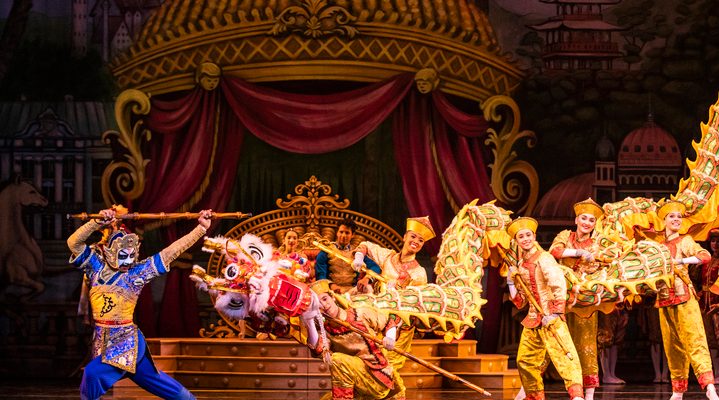“We realized that we didn’t have to get hundreds of thousands of people to sign the Final Bow pledge,” he says. “We just needed to change the minds of one or two people who are leaders in the space, and then create a trickle-down effect.”
The first of those leaders turned out to be Peter Martins, formerly the head of City Ballet. Martins had received numerous letters from audience members objecting to insensitivity in the “Tea” section of the company’s Nutcracker—a cherished version choreographed by George Balanchine, a City Ballet cofounder, in 1954. Pazcoguin knew that Chan, a friend of hers, had worked with the Asian American Arts Alliance and might have ideas about modifications. At her suggestion, Martins invited him to meet.
The two had a frank conversation in which, Chan recalls, they discussed how Asians historically have been (mis)represented in American popular media, relative to events like the Chinese Exclusion Act, Japanese internment, and the Vietnam War. Chan also shared his painful experience of watching Martins’s Magic Flute.
“I think in that moment he really got it,” Chan says. “He looked me in the eye and he gave me a hug. He was like, ‘I’m sorry. I hear you. We won’t make that mistake again.’”
As the meeting ended, it was clear to Chan that Martins was willing to alter Balanchine’s hallowed Nutcracker and, indeed, the next time City Ballet performed “Tea,” it looked markedly different. Chan remembers thinking: “If Martins is willing to change the gold standard of The Nutcracker, why not everybody else?” (Martins retired from City Ballet in December 2017 amid allegations of sexual harassment and verbal and physical abuse. In February, City Ballet determined the allegations were unfounded.)
Leveraging their ballet connections (Chan used to work for the ballet competition Youth America Grand Prix), he and Pazcoguin drew up their pledge and took it to the leaders of well-known companies like the Washington Ballet, Dance Theatre of Harlem, Pacific Northwest Ballet, and Ballet West. They used signatures from those high-profile companies to garner support from smaller troupes, then went back to larger institutions and encouraged them to follow suit.
Most recently, Chan has worked on what he describes as a “problematic production” of Cole Porter’s Anything Goes (1934), and on a restaging of George Balanchine’s first collaboration with Igor Stravinsky, Le chant du rossignol or The Song of the Nightingale (1925), which is based on a Hans Christian Andersen fairy tale.
“Our larger plan is to beef up the yellowface.org site to serve as a resource for both amateur and professional performing arts organizations,” says Chan. “We want to help people stage classic Western works in a respectful and creative way that works for a diverse 21st-century audience.”
Looking back on Final Bow’s evolution, Chan observes that he and Pazcoguin initially felt powerless to invoke change on a wide scale, but were determined to try. “This was our way of saying, okay, we can’t change a lot of the horrible things that are happening in the world, but what can we change in our corner? What’s one small thing we can make better in our neighborhood? This was it.”
The lesson for him? “We have more power than we thought.”

